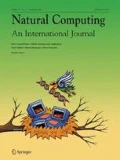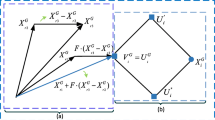Abstract
Differential evolution (DE) algorithm is a population based stochastic search technique widely applied in scientific and engineering fields for global optimization over real parameter space. The performance of DE algorithm highly depends on the selection of values of the associated control parameters. Therefore, finding suitable values of control parameters is a challenging task and researchers have already proposed several adaptive and self-adaptive variants of DE. In the paper control parameters are adapted by levy distribution, named as Levy distributed DE (LdDE) which efficiently handles exploration and exploitation dilemma in the search space. In order to assure a fair comparison with existing parameter controlled DE algorithms, we apply the proposed method on number of well-known unimodal, basic and expanded multimodal and hybrid composite benchmark optimization functions having different dimensions. The empirical study shows that the proposed LdDE algorithm exhibits an overall better performance in terms of accuracy and convergence speed compared to five prominent adaptive DE algorithms.


Similar content being viewed by others
References
Abbass HA (2002) The self-adaptive pareto differential evolution algorithm. In proceedings of IEEE Congress on evolutionary computation (CEC2002), pp 831–836
Brest J, Greiner S, Boskovic B, Mernik M, Zumer V (2006) Self adapting Control parameters in differential evolution: a comparative study on numerical benchmark problems. IEEE Trans Evol Comput 10(6):646–657
Cervantes A, Galvan IM, Isasi P (2009) AMPSO: a new particle swarm method for nearest neighbourhood classification. IEEE Trans Syst Man Cybern Part B Cybern 39(5):1082–1091
Chen CH, Lin CJ, Lin CT (2009) Nonlinear system control using adaptive neural fuzzy networks based on a modified differential evolution. IEEE Trans Syst Man Cybern Part C 39(4):459–473
Das S, Abraham A, Konar A (2008) Automatic clustering using an improved differential evolution algorithm. IEEE Trans Syst Man Cybern Part A Syst Hum 38(1):218–237
Das S, Suganthan PN (2011) Differential evolution: a survey of the state of the art. IEEE Trans Evol Comput 15(1):4–31
Das S, Konar A, Chakraborty U (2005) Improved differential evolution al algorithms for handling noisy optimization problems. In proceedings of IEEE Congress evolutionary computation, pp 1691–1698
Eiben AE, Hinterding R, Michalewicz Z (1999) Parameter control in evolutionary algorithms. IEEE Trans Evol Comput 3(2):124–141
Epitropakis MG, Plagianakos VP, Vrahatis MN (2008) Balancing the exploration and exploitation capabilities of the differential evolution algorithm. In proceedings of IEEE Congress on evolutionary computation (CEC2008), pp 2686–2693
Fan HY, Lampinen J (2003) A trigonometric mutation operation to differential evolution. J Glob Optim 27(1):105–129
Freitas AA (2002) Data mining and knowledge discovery with evolutionary algorithms. Springer, Berlin
Garcia S, Cano JR, Herrera (2008) A memetic algorithm for evolutionary prototype selection: a scaling up approach. Pattern Recognit 41(8):2693–2709
Gmperle R, Mller SD, Koumoutsakos P (2002) A parameter study for differential evolution. In: Grmela A, Mastorakis NE (eds) Advances in intelligent systems, fuzzy systems, evolutionary computation. WSEAS Press, Interlaken Switzerland
Hatamlou A, Abdullah S, Nezamabadi-pour H (2012) A combined approach for clustering based on K-means and gravitational search algorithms. Swarm Evol Comput 6(October):47–52
Johnson NL, Kotz S, Balakrishnan N (1994) Continuous univariate distributions, vol 1. Wiley, New York Chapter 16
Krink T, Filipic B, Fogel GB (2004) Noisy optimization problems: a particular challenge for differential evolution. In proceedings of IEEE Congress on evolutionary computation (CEC2004), pp 332–339
Lampinen J, Zelinka I (2002) On stagnation of the differential evolution algorithm. In proceedings of 6th International Mendel Conference on Soft Computing, pp 76–83
Levy PF (2001) The Nut Island effect: when good teams go wrong. Harvard business review. Harvard Business School Publishing, Boston
Liu J, Lampinen J (2005) A fuzzy adaptive differential evolution algorithm. Soft Comput 9(6):448–462
Liu B, Zhang X, Ma H (2008) Hybrid differential evolution for noisy optimization. In proceedings of IEEE Congress on evolutionary computation (CEC 2008), pp 587–592
Mallipeddi R, Sugnathan PN, Pan QK, Tasgetiren MF (2011) Differential evolution algorithm with ensemble of parameters and mutation strategies. Appl Soft Comput 11(2):1679–1696
Maryinovic G, Bajer D (2013) Data clustering with differential evolution incorporating macro-mutations. Swarm Evol Memet Comput Lect Notes Comp Sci 8297:158–169
Mendes R, Mohais AS (2005) DynDE: a differential evolution for dynamic optimization problems. In proceedings of IEEE Congress on evolutionary computation, pp 2808–2815
Omran M, Salman A, Engelbrecht AP (2005) Self-adaptive differential evolution. Computational intelligence and security, Part 1. Lecture Notes Comp Sci Springer 3801:192–199
Pappa GL, Freitas AA (2009) Automating the design of data mining algorithms: an evolutionary computation approach. Springer, Natural Computing Series
Price KV (1999) An introduction to differential evolution. New ideas optim. McGraw-Hill Ltd., UK Maidenhead, UK, England, pp 79–108
Price KV, Stron R, Lampinen J (2005) Differential evolution—a practical approach to global optimization. Springer, Berlin
Qin AK, Huang VL, Suganthan PN (2009) Differential evolution algorithm with strategy adaptation for global numerical optimization. IEEE Trans Evol Comput 13(2):398–417
Repinek M, Liu SH, Mernik M (2013) Exploration and exploitation in evolutionary algorithms: a survey. ACM Computing Surveys 45(3), Article No. 35
Samorodnitsky G, Taqqu MS (1994) Stable non Gaussian random processes. Chapman and Hall, New York
Soliman OS, Bui LM (2008) A Self-adaptive strategy for controlling parameters in differential evolution. In proceedings of IEEE Congress on evolutionary computation (CEC2008), pp 2837–2842
Storn R, Price KV (1997) Differential evolution: a simple and efficient heuristic for global optimization over continuous spaces. J Glob Optim 11(4):341–359
Storn R, Price KV (1995) Differential evolution: a simple and efficient adaptive scheme for global optimization over continuous spaces. ICSI, USA, Technical Report TR-95-012, March
Suganthan PN, Hansen N, Liang JJ, Deb K, Chen Y-P, Auger A, Tiwari S (2005) Problem definitions and evaluation criteria for the CEC05 special session on real-parameter optimization. Technical Report Nanyang technological university, Singapore, May
Teo J (2006) Exploring dynamic self-adaptive populations in differential evolution. Soft Comput 10(8):673–686
Thangaraj R, Pant M, Abraham A (2009) A simple adaptive differential evolution algorithm. In proceedings of world Congress on nature and biologically inspired computing (NaBIC 2009), pp 457–462
Triguero I, Garcia S, Herrera F (2011) Differential evolution for optimizing the positioning of prototypes in nearest neighbour classification. Pattern Recognit 44(4):901–916
Vesterstrm J, Thomson R (2004) A comparative study of differential evolution, particle swarm optimization, and evolutionary algorithms on numerical benchmark problems. In proceedings of IEEE congess evolutionary Computation (CEC2004), pp 1980–1987
Wolpert DH, Macready WG (1997) No free lunch theorems for optimization. IEEE Trans Evol Comput 1(1):67–82
Yang Z, Tang K, Yao X (2008) Self-adaptive differential evolution with neighbourhood search. In proceedings IEEE Congress on evolutionary computation (CEC2008), pp 1110–1116
Zaharie D, Petcu D (2003) Adaptive pareto differential evolution and its parallelization. In proceedings of 5th International Conference on parallel process. Applied on Mathematics, pp 261–268
Zolotarev VM (1986) One-dimensional stable distributions. American Mathematical Society, Providence RI (Russian edition: 1983)
Author information
Authors and Affiliations
Corresponding author
Rights and permissions
About this article
Cite this article
Jana, N.D., Sil, J. Levy distributed parameter control in differential evolution for numerical optimization. Nat Comput 15, 371–384 (2016). https://doi.org/10.1007/s11047-015-9488-3
Published:
Issue Date:
DOI: https://doi.org/10.1007/s11047-015-9488-3




